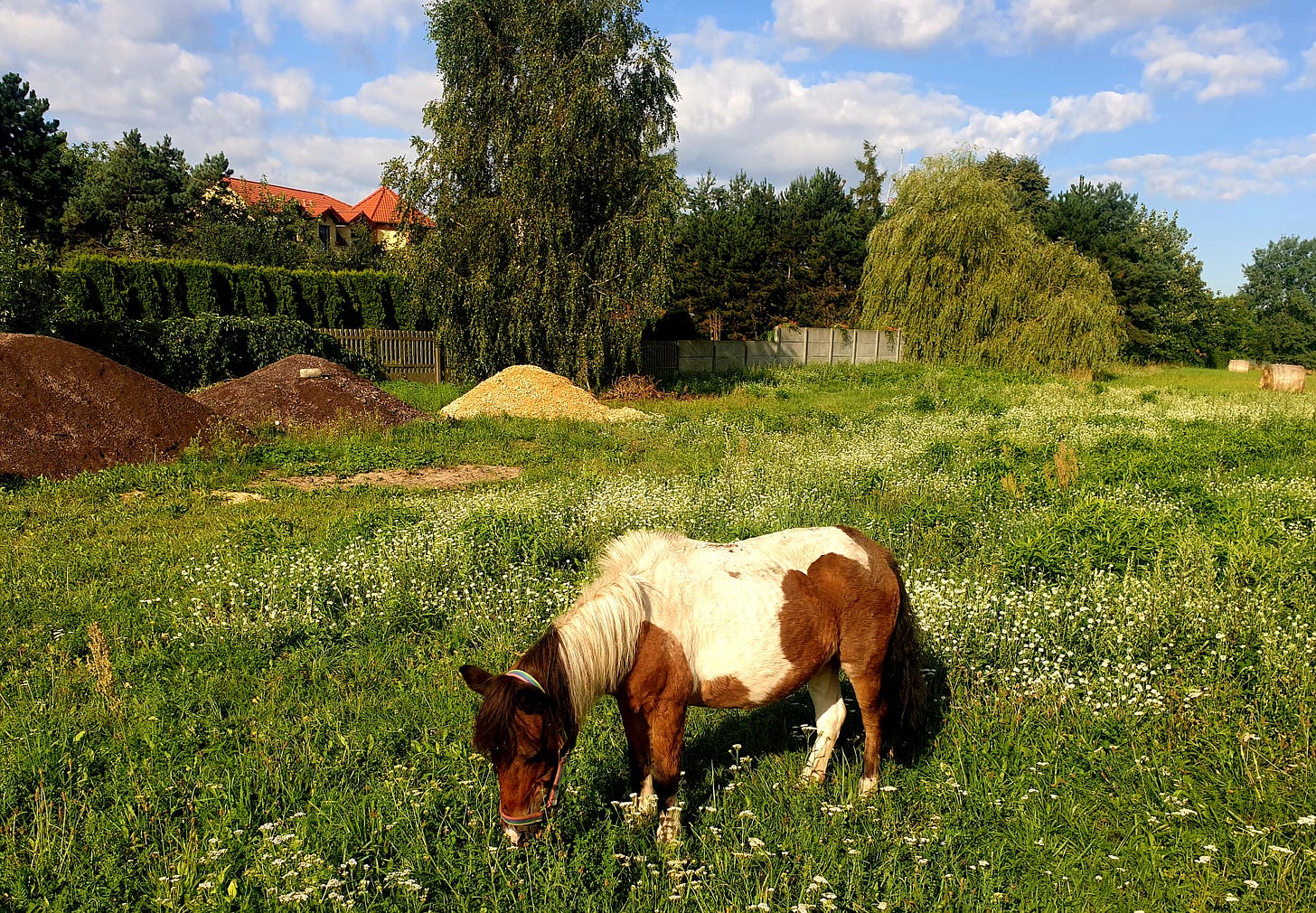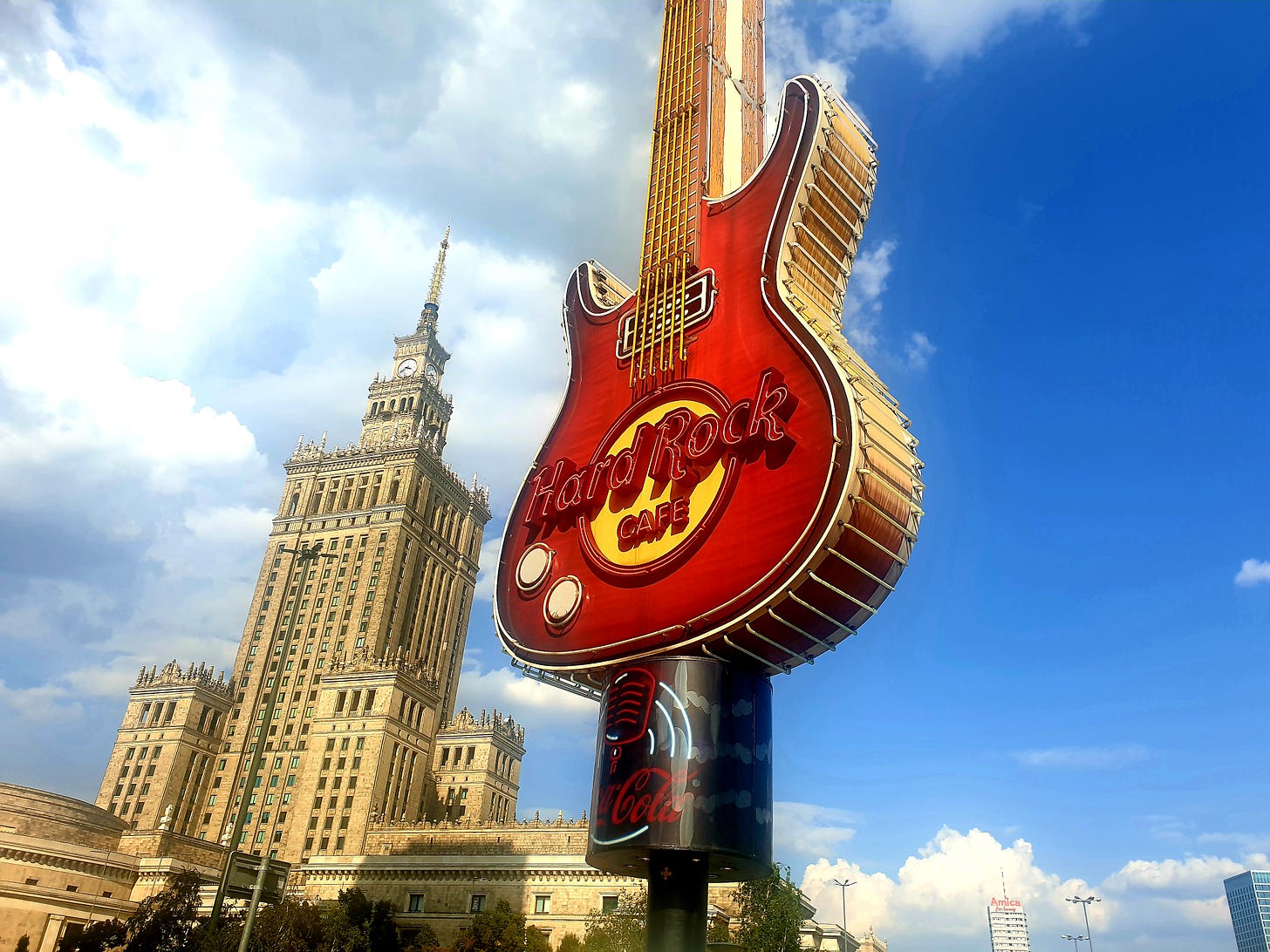August Diary
Hello,
Obligatory shilling. What a busy month! (Well, five weeks.)
I wrote for my paying Substack subscribers about Ukraine and truth, fertility rates, the War on Terror, Polish food, pseudo-trends, transgression and heterodoxy, gentrification, the worst film ever made and death.
For Quillette, I wrote about Polish resistance under partitioning and occupation.
I wrote for The Critic about COVID and monkeypox, Philip Larkin, academic pathologies, Salman Rushdie, British criminal justice and how to use less energy.
I wrote for the Spectator World about Alex Jones, Dark Brandon and masculinity gurus.
The old, cold country. When I came to Poland, it seemed noticably poorer than Britain. Poland seemed culturally richer in many ways. But there was more poverty, fewer business, fewer goods et cetera. Now it almost feels like the sides have switched. I am goes to stress that “almost”. God knows people have problems making ends meet here. Inflation is dramatic. Institutions are stressed. But new bars and restaurants are opening all the time in my town and in Britain 70% of pubs face the threat of closure as energy prices soar. Last week I saw a GP on a day’s notice, and booked an appointment with a specialist for next month. In Britain it sounds like you could learn a new language in the time it takes to see one — and learn Mandarin while you wait to see a specialist. With the world as unstable as it is, things could all change. But it is striking how much grimmer and more stressful life in Britain sounds.
A proud editor, brother and friend. If I started talking about the pieces I am proud to have worked on at The Critic I could take up 10,000 words (Simon Evans’s piece on not reading books, Fergus Butler-Gallie’s article on Bosworth Field, Anthony Bowles’s piece on immigration et cetera). It was especially satisfying, though, to publish two articles by my sister Lucy. Yes, I know what you are thinking. But she is a tremendously talented, thoughtful and sensitive writer, as her pieces about death and education illustrate. I wish I had more of her poetic skill! I was also proud to publish my old schoolfriend Jack. Yes, I know what you’re thinking again. But not many people have lived in China for seven years and can offer first-hand insights into its COVID response and nationalist turn.
Anglofuturism. Aris Roussinos makes a stirring case for Anglofuturism:
“Anglo”, because Britain should survive as an entity focused on the health and prosperity of the people, and not merely as a theme park for international capital. Through shifting domestic industry abroad and encouraging mass immigration of low-wage labour at home, policymakers were able to create the illusion of prosperity, conjuring the outward form of a middle-class existence even as it demolished its foundations. But this world has now gone forever, leaving us poorer and less resilient.
The “futurism” is for the understanding that unlike our current political class, this approach looks beyond the electoral cycle. It is the idea that the state, and the nation, have interests to be safeguarded over the course of generations, and that infrastructure should be built now to secure the lives and prosperity of our descendents. “Futurism” also because it harnesses the optimism and high modernism of the post-war era, a vanished world of frenetic housebuilding and technological innovation where British scientific research could lead the world, and produce higher living standards through its fusion with well-paid, high-skilled labour.
Anglofuturism is also the pre-war British spirit of adventure, which I say not to defend R.E.H Dyer but to laud Drake, Cook, Darwin and Shackleton.
Vibes. Ed West explores the mysterious means by which people arrive at opinions:
Vibes is the reason why highly-partisan people will justify the most ludicrous of causes. This week, for example, a number of academics were willing to defend a bizarre paper on masturbating to hand-drawn child porn, which is about as morally indefensible as things get. A Tory MP criticising an academic for doing something that outrages public morality? I don’t know what it’s about, I just know the vibes.
Autumn’s claws. I always feel like I have squandered the summer. It can be true. This year, though, I began a new job, started an exciting project, had a lot of walks and runs and spent a lot of time with friends. That is objectively not a waste of a summer. But I still feel like I could have done much more. No doubt that’s how many of us are doomed to feel about life. But perhaps we would be less active if we didn’t.
Billboards have many uses. Wessie du Toit explores China’s experiment with consumer communism:
Red flags and monuments sit alongside Starbucks and Costa Coffee, the iconic glowing towers of the financial district looming in the background. On the spotless metro, advertising for dairy products accompanies propaganda videos about China’s rise to greatness.
Have a great September!
Ben





When I moved to Britain in 2004, it was definitely materially richer AND culturally richer. While it has succeeded in catching up economically (it had been projected it would be as rich as Britain by 2030, but recent events will probably slow that progress). But wrt to culture: IMHO Poland is rich, but not rich-er. Here, there’s is a book club in every village (plus many other societies) and most women I know are members of one or two of such societies/clubs, and some are also volunteers. In Poland only one is s member of a book club and they are mostly limited to large cities. I’ve never heard of events such as open heritage days/open gardens/open artists studios happening in small towns or even cities, and they are common here. Volunteering in Britain is massive, fetes, cake sales, charity events etc have a long and rich history, while in Poland, it’s a fledgling sector and the scale and frequency of charity events is far smaller. Britain still publishes a higher no of titles per year and has many more literary festivals (I think when I left there was one - there are more now, but still fewer). In hindsight, I think the most shameful aspect of the behaviour of people in charge of culture was the destruction and neglect of the remnants of the Prussian and Jewish culture, and I’m talking about the first democratic decade, not communists - I remember the sadness of Jewish friends visiting in the late 1990s and seeing the total neglect of Jewish cemeteries - I’m glad it’s changing. My friend works in a museum in one of the largest cities - they have no outreach programme, no evening/fundraising events, no volunteers - all of which applies to my local museum. Poland has no equivalent of the many heritage trusts so all historic properties, museums, gardens etc have to be financed from ticket sales and from the central budget, so some historic properties have gone to seed and can be purchased for a song. The horticultural and gastronomic culture had both been destroyed in the war and then under communism. Even the tiny Denmark has 28 Michelin-starred restaurants, while there was only one in Warsaw and I’ve heard it’s closed (I’m setting aside the question how valid this guide still is). Yes, it does feel like Britain doesn’t work, certainly the police, education and the NHS need massive reforms and everything is skewed to benefit the old in the way it isn’t in Poland. My brother has an ordinary job yet was able to buy a big house - land and property prices are, in my view, Poland’s biggest advantage over Britain. I couldn’t be happier the Polish food and dining scene are flourishing and I sing their praises whenever I can, but it is in Britain that I discovered high-quality food scholarship, writing and criticism. I feel like I’m rambling, sorry, it’s a huge subject that far outstrips the comment section which is why I’m writing a book that does take on the pros and cons of both countries🙂